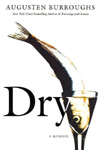
Comment
on this story
|
 |

With Dry, Burroughs proves he's all steak while Sylvia Smith lacks even the sizzle.
by Julia Watts
Anyone who has read Augusten Burroughs' best-selling memoir Running With Scissors knows that the man's childhood was dire enough to make the miserable orphans in the works of Charles Dickens look like Beaver Cleaver. In Dry ($24.95, St. Martin's), the memoir of his alcoholism and recovery, Burroughs shows how the dysfunction of his childhood followed him into his adult years. And yet despite his topic's seriousness, Dry, like Running With Scissors, is a hilarious book. In both his books, Burroughs pulls off the difficult trick of making the reader laugh at topics that would normally be sources of horror instead of humor. He puts the "fun" in "dysfunctional."
Unlike many memoirs of addiction, Dry does not chronicle the author's slow slide from social drinking into alcoholism. When the book opens, Burroughs is a full-fledged, martini-guzzling alcoholic who, unlike his favorite TV character, Darren Stevens from Bewitched, is unable to  balance his heavy drinking with his high-powered advertising career. Burroughs is given a choice: get into rehab or get fired. He calls the rehab center with a beer in his hand, musing: "It dawns on me that this is a slightly contrary action. Like stopping into Baby Gap before having an abortion." balance his heavy drinking with his high-powered advertising career. Burroughs is given a choice: get into rehab or get fired. He calls the rehab center with a beer in his hand, musing: "It dawns on me that this is a slightly contrary action. Like stopping into Baby Gap before having an abortion."
Burroughs enters the Proud Institute, a rehab center for gay men and lesbians, because he thinks it will be more fabulous than straight-person's rehab. Unfortunately, when he arrives, he is confronted by lousy cafeteria food, paper hospital slippers, and group therapy sessions in which he is forced to cuddle dirty plush stuffed animals ("Monkey Wonkey and Blue Blue Kitten want to make friends with...YOU!!!"). The cliché-spewing, pep-talking atmosphere of rehab clashes with Burroughs' cynical personality, but because of one good therapist, one good friend, and the lack of access to alcohol, he is able to improve.
Of course, Burroughs discovers that the real work of sobriety doesn't happen in rehab but in real life, as he tries to get back on track at work, avoid toxic relationships, attend endless AA meetings, and pass up martinis at his favorite bar in favor of coffee at Starbucks. (One of his fellow AA members remarks, "Starbucks is my higher power.") For Burroughs sobriety also brings self-awareness, a state that he, a self-proclaimed shallow person, has always tried to avoid. Sober, he has to face his fears, the largest of which is the impending death of his best friend from AIDS.
While Burroughs' writing is often hilarious, his humor shouldn't be mistaken for flippancy. Despite his claim of shallowness, Burroughs looks deeply at himself and at the nature of addiction, and by the book's end, the tears in the reader's eyes are not just tears of laughter.
A writer does not have to have lived as dramatically as Augusten Burroughs in order to write a good memoir. That being said, I must confess that I read most of Sylvia Smith's memoir Appleby House (Anchor, $12) wishing that something...anything...of interest would happen to the heroine. An account of Smith's time in a rooming house in London's working class East End, Appleby House deals with such dramas of group housing as a neighbor who plays her music too loud and the controversy over whose turn it is to put out a new roll of toilet paper in the shared bathroom. These little everyday struggles might be the basis for an amusing essay, but as a book they wear a bit thin. controversy over whose turn it is to put out a new roll of toilet paper in the shared bathroom. These little everyday struggles might be the basis for an amusing essay, but as a book they wear a bit thin.
I had hoped that the peek into the lives of working class British women might prove interesting, but Smith only skims the surface of her housemates' lives and indeed her own life. Smith's laundering and bathing habits are outlined in great detail, but an examination of her inner life is almost entirely absent—a strange quality in a memoir. I read most of the book with the anticipation that something was about to happen (surely it had to), but the highest point of drama was when Smith contracted food poisoning from a bad pork chop.
On the jacket copy, Bridget Jones creator Helen Fielding calls Appleby House "a hilarious and poignant little page-turner." This is a phrase I would use to describe Fielding's books but not this one. As far as current memoirs go, Dry is quite a juicy read, but Appleby House is rather...dry.

August 7, 2003 * Vol. 13, No. 32
© 2003 Metro Pulse
|